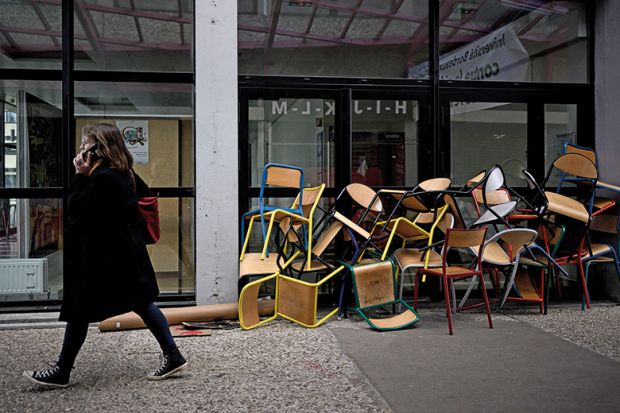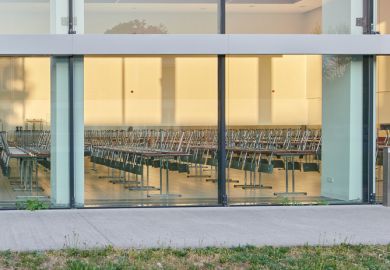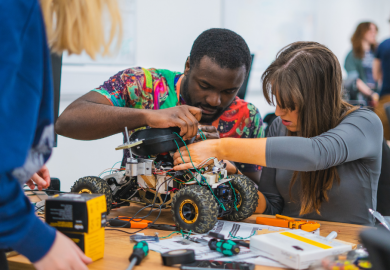Lecture attendance is now so low that some academics have started to openly question the future of the teaching method.
Scholars’ accounts of teaching to empty rooms in recent months have amplified concerns that the post-Covid decline in attendance, with many students preferring to catch up remotely, has been exacerbated by a cost-of-living crisis that has forced some undergraduates to prioritise paid work over attending classes.
Rob Briner, professor of organisational psychology at Queen Mary University of London, recently had a single student show up for a class from a 70-strong master’s cohort.
“That was quite extreme, but it’s not uncommon to have 25 per cent of a class attend, maybe less,” said Professor Briner, who added that colleagues in other departments and institutions had noted similarly high levels of student no-shows. “There’s definitely not the same feeling that you have to show up that once existed.”
While low attendance rates have often been attributed to students preferring to catch up online, Professor Briner said that this was not borne out by viewing figures. “Students might have the intention to do this, so they skip the lecture, but these lectures are rarely watched,” he explained, adding that the poor audio and visual quality of captured lectures seldom made compelling viewing.
Campus resource collection: Show time: how to be an engaging teacher
Higher levels of student employment in term-time were more likely to explain lower attendance, said Professor Briner, whose poorly attended talk was a careers-focused workshop which was not mandatory. “Many people are working part-time, even full-time, and that’s having an impact.”
A survey conducted by Times Higher Education in 2022 found that 76 per cent of academics globally felt that class attendance was lower than before the pandemic. Some 29 per cent said that between 41 and 60 per cent of students typically turned up, while 26 per cent put attendance at between 21 and 39 per cent.
More recently, US professors have relayed reports of 25 per cent attendance in some lecture courses, while in Australia academics have discussed the difficulties of lecturing to empty theatres.
“It does raise the question, ‘What’s the point of lectures?’ Maybe they are redundant,” continued Professor Briner.
“People got used to a world in lockdown where they think it’s fine to not show up in person, to contribute virtually and think, ‘Why do I need to be there?’ As someone interested in how organisations work, I have some sympathy for that view.”
Detailing his experience on social media, Professor Briner admitted that the experience of a student no-show had left him with feelings of “rejection”, “bewilderment” and even “professional incompetence”.
“We are always told to consider student well-being, but what impact is this having on staff?” he told THE.
Liam McLoughlin, a lecturer in media and communication at the University of Liverpool, had some sympathy, having shared a photo of an entirely empty seminar room last year.
“I’ve been quite lucky in that this was seemingly a rarity, although there have been times, especially towards the end of semesters, where attendance drops – a phenomenon some of my peers across disciplines and institutions have also faced,” said Dr McLoughlin, who called it a “continuing issue without clear solutions”.
He was more optimistic that attendance levels could increase to pre-pandemic levels, stating that lecturers who created peer-led “communities of learning” would fare better.
“Making students feel that they are not just independently sitting in a class, but on a journey as a group, makes a difference,” said Dr McLoughlin, adding that this “adds value to classes through the collegiate social interactions and peer-learning that come through stronger communities”.
“The proposition to students isn’t that they can catch up if they don’t attend, but that they’ll miss out on that social learning if they stay at home,” he said.
However, some factors were outside the control of staff and students, Dr McLoughlin added. “Student accommodation is eye-wateringly expensive, and students have told me the decision for them is either go to work or turn up to class unsure if they have enough money to eat and sleep,” he said.
“When students are in an economic system like that, there is little we can do in the classroom to make a difference.”
That many students watched lectures on playback at one-and-a-half or double speed suggested they were not valued as a learning resource, said Eric Mazur, Balkanski professor of physics and applied physics at Harvard University, who estimated in-person turnout was about 60 per cent.
“The lecture gives the perfect illusion of learning for both students and lecturers, but it just doesn’t intellectually engage students in a meaningful way,” said Professor Mazur, often regarded as the “father of the flipped classroom”, who abolished lectures in his courses years ago.
“The lecture can sometimes inspire and stimulate, but it doesn’t really educate. It’s a format that was introduced into universities when there were no books – or printed ones, at least – and we should stop pretending that we’re teaching in the Middle Ages.”
Register to continue
Why register?
- Registration is free and only takes a moment
- Once registered, you can read 3 articles a month
- Sign up for our newsletter
Subscribe
Or subscribe for unlimited access to:
- Unlimited access to news, views, insights & reviews
- Digital editions
- Digital access to THE’s university and college rankings analysis
Already registered or a current subscriber?










